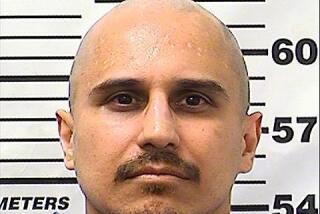High Court to Rule on Felon’s Bid to Forgo Lawyer
- Share via
WASHINGTON — The U.S. Supreme Court agreed Monday to decide whether an Orange County man convicted of embezzlement--or other felons, for that matter--has a constitutional right to reject a lawyer’s help on appeal and represent himself.
But before the court gets to that issue, it must determine whether Salvador Martinez, a one-time paralegal convicted previously of three robberies and other crimes, can represent himself before the nation’s high court.
“I’d bet my money against that, but stranger things have happened,” said Robert M. Foster, a deputy California attorney general arguing the state’s case.
If allowed to represent himself, Martinez would be the first felon to argue his own appeal in the Supreme Court, said the court’s spokeswoman, Kathy Arberg. She would not say specifically whether the justices would allow that.
“Technically speaking, any litigant can argue his case in any U.S. court,” she said, citing a federal law.
The only nonlawyer to argue in the high court was investor Samuel Sloan in a 1978 civil case, she said. He challenged the Securities and Exchange Commission’s right to halt stock trading under certain circumstances, and won.
Also at issue in the Martinez appeal is a fundamental states’ rights question about how far federal law can go in interfering with a state system of jurisprudence, Foster said. He argues that the constitutional right to a fair trial does not apply to appellate reviews.
“The question is whether the federal constitution compels California to adopt a specific appeals system,” he said.
The California Supreme Court has ruled that criminal defendants can represent themselves during trial, but not during appeal, Foster said. He explained that because appeals are legally complex, especially in capital cases, lawyers are better equipped to deal with the process.
Martinez, 50, was accused of pocketing $6,000 from a woman who had given him money to bail her boyfriend out of jail, said Deputy Dist. Atty. Tamara Jacobs, who tried the case. Martinez, who was working at a Santa Ana law firm at the time, never posted the bail, and the money was not recovered.
Martinez chose to represent himself during his trial. He was convicted of embezzlement and, because of his prior felony convictions, was sentenced to 25 years to life in prison under California’s three-strikes law.
Undeterred, he waived his right to a lawyer’s help in his state appeals and said he wanted to represent himself. His request was denied by a state appellate court and the state Supreme Court. California law requires that a lawyer handle appeals so a case can be thoroughly reviewed.
Now a state prison inmate at Lancaster, Martinez sent a petition in January to the U.S. Supreme Court arguing that because defendants can represent themselves at trial, they also should be able to represent themselves during their appeals.
In a one-line order Monday, the justices announced that this fall they will hear the case of Martinez vs. Court of Appeal of California, 98-7809.
More to Read
Sign up for Essential California
The most important California stories and recommendations in your inbox every morning.
You may occasionally receive promotional content from the Los Angeles Times.













